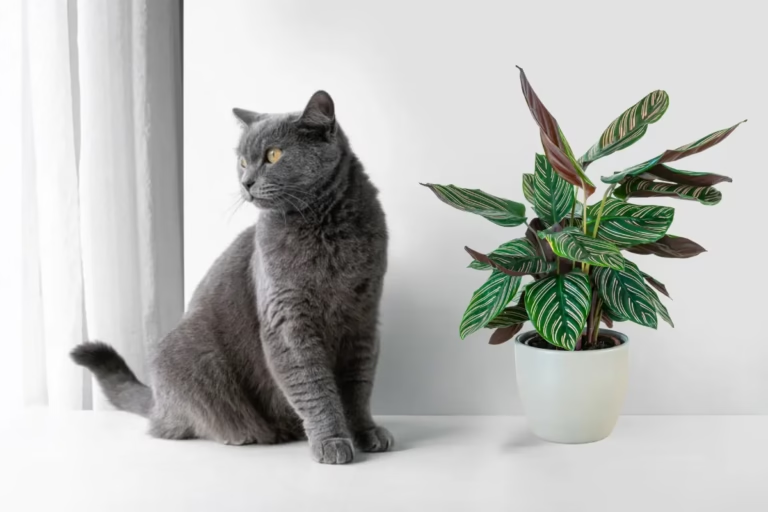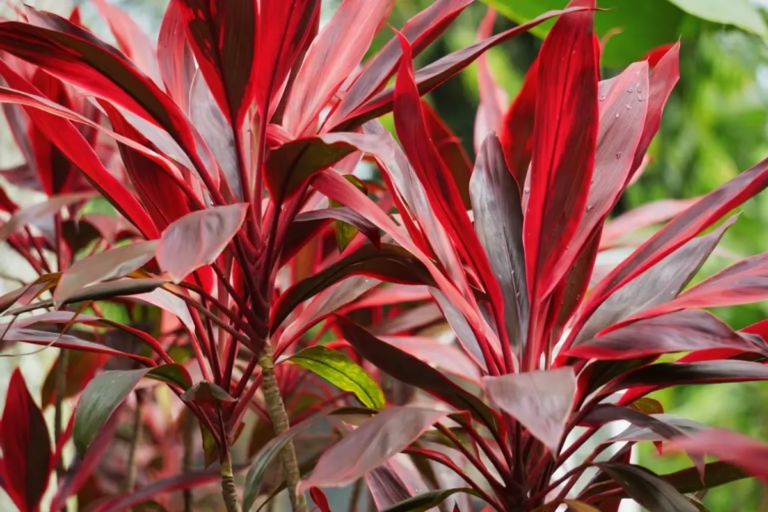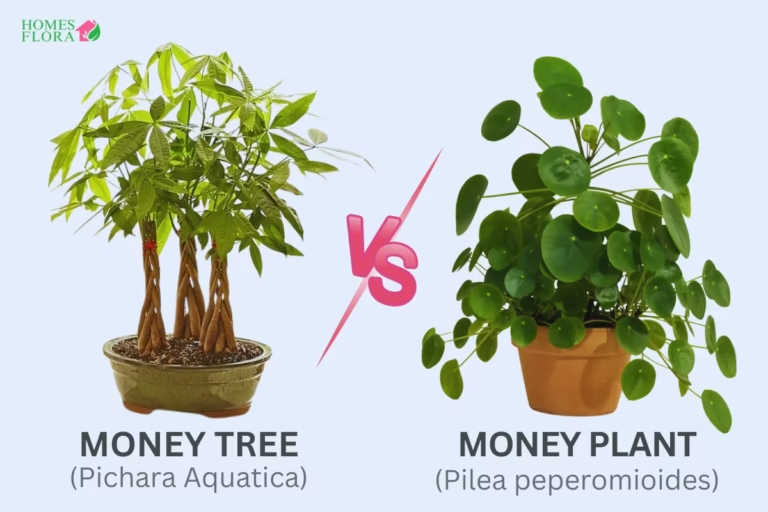Is Money Tree Toxic to Cats & Dogs? Safety guide
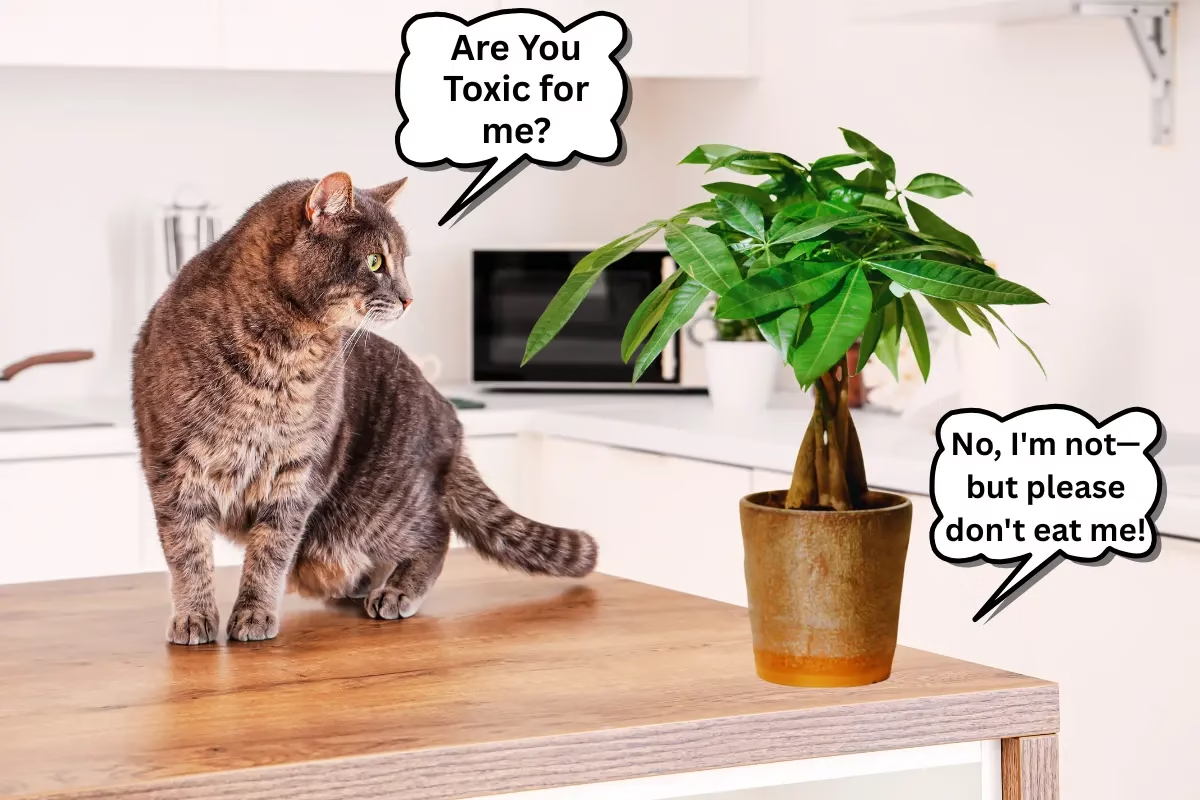
If you’re concerned about whether Money Trees are toxic to cats or dogs, it’s important to have clear, accurate information. Many pet owners are unsure about the safety of common houseplants, especially when curious animals start chewing on leaves. This guide explains everything you need to know about the Money Tree’s potential effects on pets, including symptoms to watch for and tips to help keep both your plants and animals safe.
Quick Answer
The Money Tree (Pachira aquatica) is considered non-toxic to cats and dogs by the ASPCA and similar organizations, meaning it’s not poisonous. But if the leaves are ingested, it may potentially cause mild gastrointestinal upset like vomiting, diarrhea, or lethargy. Eating the plant should be discouraged, and it’s best to keep it away from pets to avoid any toxic effects.
What is a Money Tree?
The “money tree” plant, known botanically as Pachira aquatica, has several other common names. These include Guiana chestnut, Malabar chestnut, French peanut, saba nut, Monguba, Pumpo, and Provision tree. It it’s a tropical beauty native to the wetlands of Central and South America. You can recognize it by its charming braided trunk and those lovely, glossy, hand-shaped leaves—five leaflets per stem, symbolizing the five elements of Feng Shui!
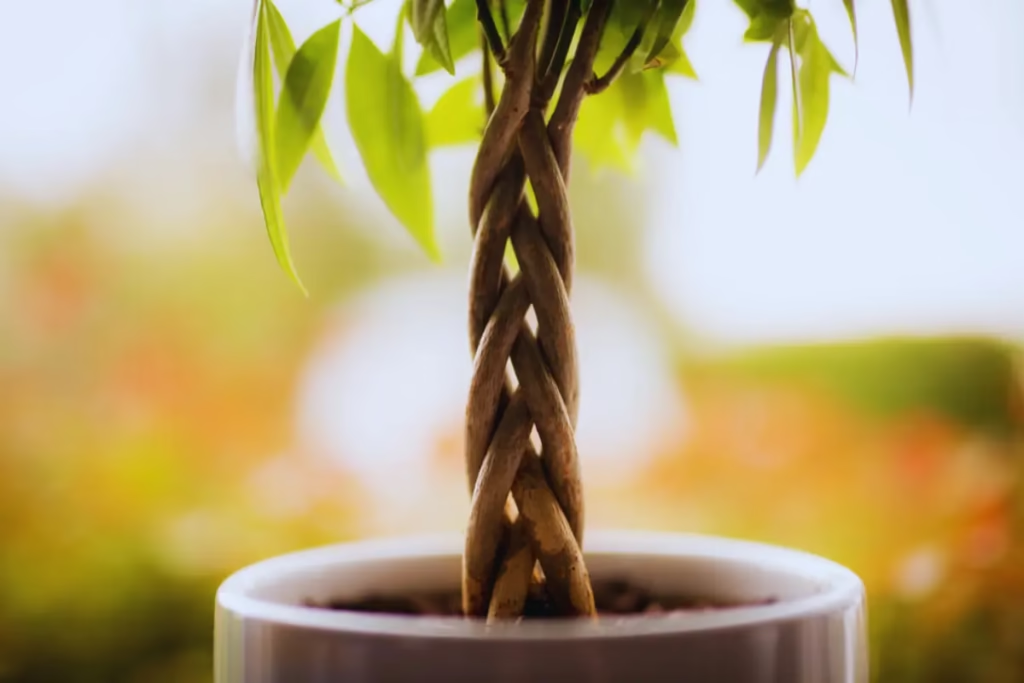
In the wild, it grows in swampy areas, but indoors? It’s a symbol of prosperity and good fortune. Just give it bright, indirect light, keep its soil slightly moist (but never soggy), and mist those leaves occasionally for extra happiness. Some say burying a coin in its pot boosts luck.
Are Money Trees Toxic To Cats?
Whenever the Money Tree and Cats meet so you the owner of both will must think about the Money Tree toxicity to cats. So the Money Tree (Pachira aquatica) is non-toxic to cats, but eating large amounts may cause vomiting, diarrhea, or mild nausea. It has no nutritional value and frequent chewing can damage the plant. Be cautious of pesticides, fertilizers, or other houseplant chemicals, which can cause digestive issues. Extra care is needed if your cat has health sensitivities or preexisting conditions.
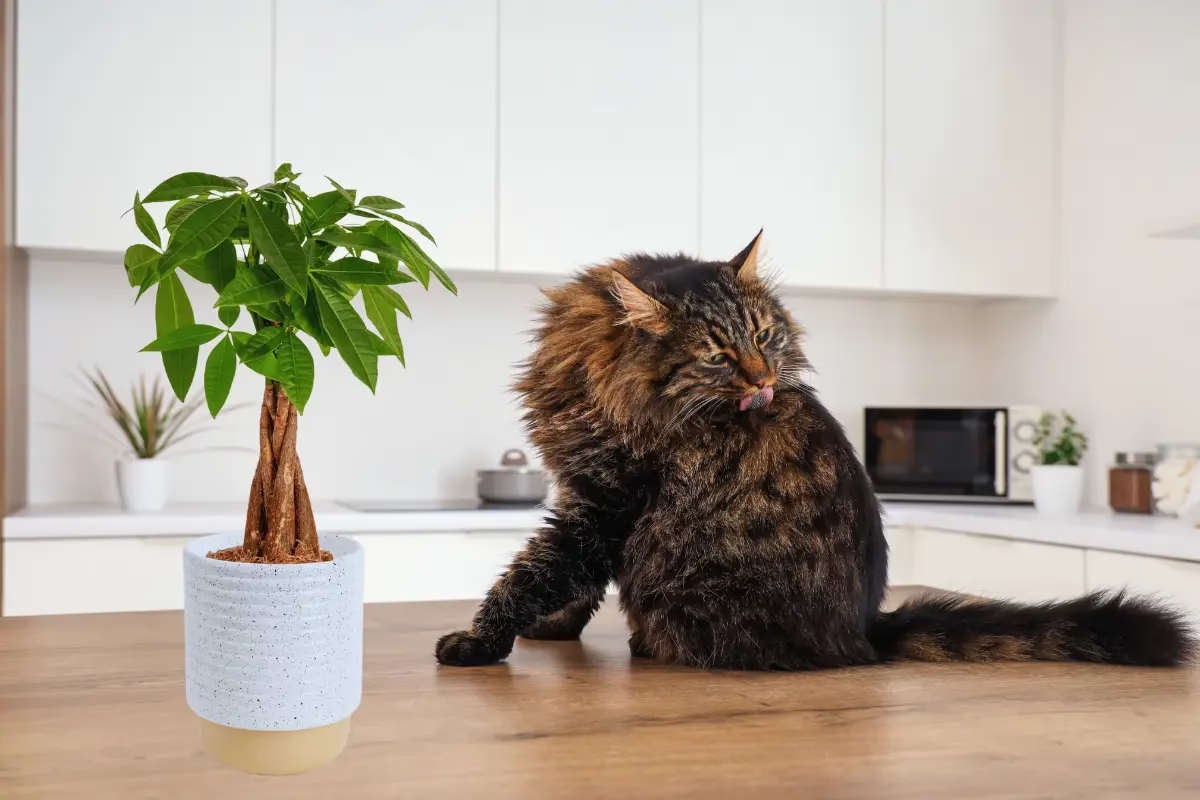
MoneyTree (Pachira aquatica) is free from the toxic material that cause severe case but still if you cat eat in large amount, there are still important considerations for pet owners.
Occasional nibble or 1-2 leaves won’t likely cause serious harm, consuming large quantities of the plant can lead to gastrointestinal problems. Additionally, be cautious of any chemicals on the plant, as these can pose additional risks to your cat’s health.
Are Money Trees Toxic To Dogs?
Let’s get straight to the point: Is the Money Tree toxic to dogs? The answer isn’t as straightforward as you might hope. While the Money Tree is not listed as poisonous, it’s still unsuitable for your furry friend to chew it habitly.
Even though it doesn’t contain harmful chemicals, eating large amounts can still lead to stomach upset, such as diarrhoea, nausea, and vomiting. Additionally, remember that chemicals from pesticides or fertilizers used on the plant can harm your cat.
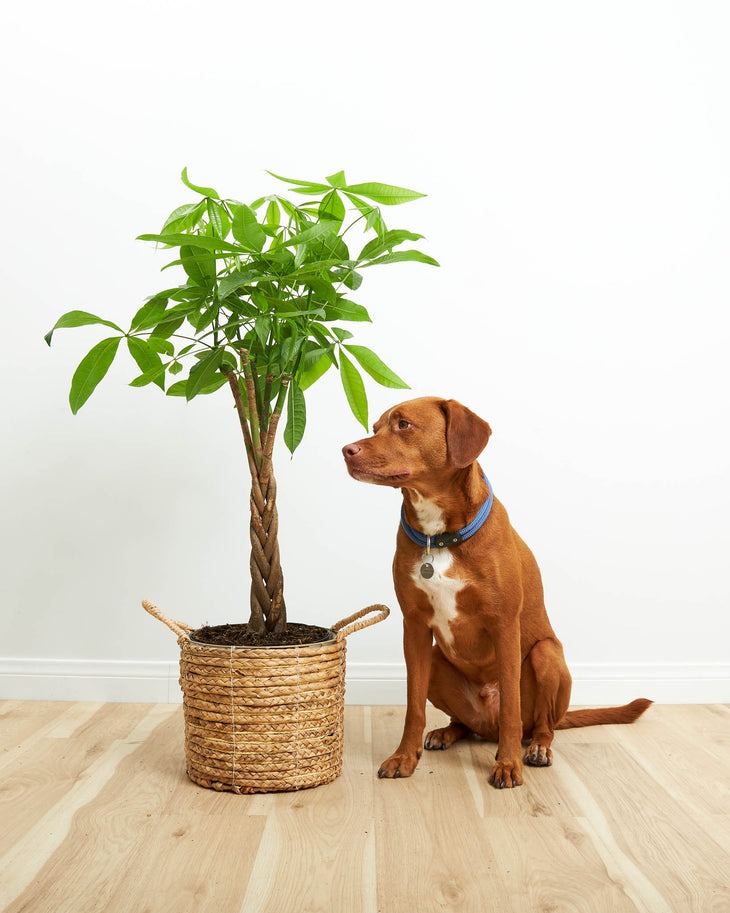
How to Tell if a Plant Is Toxic
Some plants protect themselves with natural chemicals that can be toxic to humans or pets. These include alkaloids that affect the nervous system, glycosides that can disturb the heart or digestion, and oxalates, tiny needle-like crystals that irritate the mouth and throat. Saponins can upset the stomach, while cyanogenic glycosides may release small amounts of cyanide when chewed.
Some plants also have milky latex sap or strong essential oils that can cause skin burns or rashes. These substances aren’t “bad” — they’re just nature’s way of helping plants survive. As plant lovers, we can admire their beauty and power while staying mindful and safe.
Related Post: Is Prayer Plant Toxic To Cats?
Be Careful—Not Every “Money Tree” Is Safe
If you’re wondering “is a money tree toxic to cats or dogs?”, the answer depends on which money tree you mean. The true Money Tree — scientifically known as Pachira aquatica — is non-toxic to cats and dogs, according to the ASPCA. So yes, the money tree is safe for cats and dogs when you’re referring to Pachira aquatica.
The term “money tree” can refer to several plants, but only Pachira aquatica is the true, non-toxic variety for pets. Others, like the jade plant, pothos, and lucky bamboo, Swiss Cheese Plant, are often mistaken as safe but can be toxic to cats and dogs, causing symptoms like vomiting, oral irritation, and lethargy. Always verify the scientific name to ensure your plant is truly pet-safe.
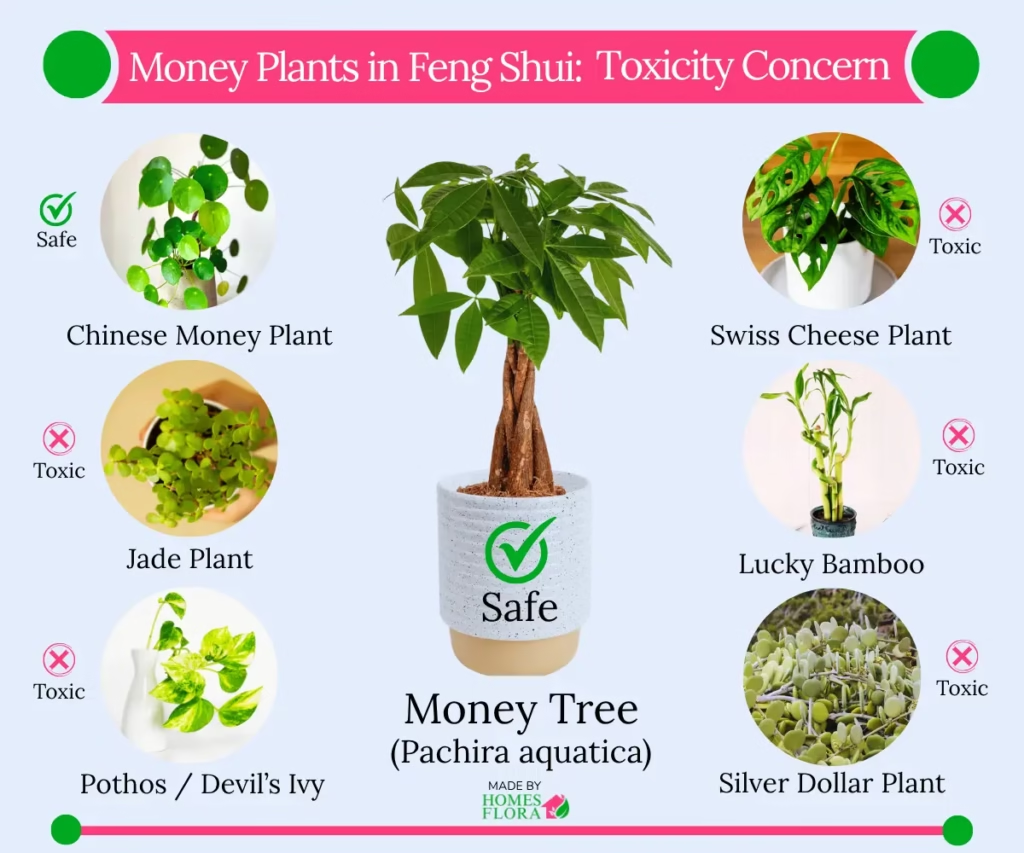
Harmful vs. Safe Money Plants for Cats and Dogs
In Feng Shui, plants like jade plant, lucky bamboo, Chinese money plant, Silver Dollar Plant, Pothos varities, and Pachira aquatica are seen as symbols of wealth and positive energy. But while these money plants promote prosperity, not all are safe for pets. Some are toxic to cats and dogs, causing health issues if chewed. The table below shows which varieties are pet-friendly and which should be kept out of reach.
Common Name | Botanical Name | Also Called | Toxic to Pets | Notes |
|---|---|---|---|---|
Money Tree | Pachira aquatica | Guiana Chestnut, True Money Tree | No | Safe for pets; braided trunk, large hand-shaped leaves |
Jade Plant | Crassula ovata | Lucky Plant, Money Plant (succulent) | Yes | Toxic; causes vomiting, depression, coordination issues |
Chinese Money Plant | Pilea peperomioides | Pancake Plant, UFO Plant | No | Safe; coin-shaped leaves, trendy indoor decor |
Lucky Bamboo | Dracaena sanderiana | Ribbon Dracaena | Yes | Toxic; may cause drooling, vomiting, appetite loss |
Pothos / Devil’s Ivy | Epipremnum aureum | Money Plant (in Asia) | Yes | Toxic; irritates mouth, vomiting, oral swelling |
Swiss Cheese Plant | Monstera deliciosa | Split-leaf Philodendron | Yes | contains calcium oxalates that irritate mouth/throat |
Silver Dollar Plant | Lunaria annua | Honesty Plant | Varies | Not common indoors; safety not well-documented |
Why Do Pets Love the Money Tree So Much?
You love your Money Tree (Pachira aquatica) — and somehow, your cat or dog knows it. Coincidence? Unlikely. Pets have a sixth sense for what’s not for them. And when it comes to plants, the temptation is real.
“It Dangles. It Taunts.”
Those shiny, fluttering leaves are like slow-motion toys for cats — moving just enough to say, “Pounce me!” For dogs, the plant’s height makes it a convenient, leafy snack bar right at nose level.
“The Forbidden Crisp”
Let’s be honest — those leaves have a satisfying crunch. To your pet, they’re like forbidden kibble or a DIY chew toy. Cats especially can’t resist the urge to shred, leaving your plant (and decor) in ruins.
“Potting Soil: Nature’s Treasure Chest”
To us, it’s soil. To pets, it’s a digging pit, litter box, or even a snack. The earthy scent triggers their curiosity — and in pet logic, if it smells interesting, it’s probably edible.
Releated: Is Peace lily Toxic to Cats and Dogs
How Overeating Money Plants Can Affect Your Cat or Dog
The Chinese Money Plant is not toxic to cats or dogs, but eating large amounts can still upset their stomach and cause digestive issues. Watch for these symptoms if your pet ingests the plant:
For Cats:
- First 6 Hours: Drooling like a leaky faucet, pawing at their mouth (those oxalate crystals stab their gums).
- Next 24 Hours: Vomiting (possibly on your favorite rug), lethargy, or dramatic refusal to eat.
- Risk Level: Moderate. Rarely fatal, but miserable for them (and your wallet).
For Dogs:
- GI Rebellion: Expect slimy puddles of vomit or diarrhea (possibly in artistic locations).
- Big Dogs vs. Small Dogs: A Great Dane might just get an upset tummy; a Chihuahua could need IV fluids.
If you notice any of these signs, contact your veterinarian. They can provide supportive care to help your pet feel better and recover quickly.
Related Post for Pet Owners: Reasons Why Are Dogs Better Than Cats | Pets Combat
What to Do If Your Cat Eats a Money Tree
Pachira aquatica is not considered safe for cats but it doesn’t to eat it. Ingesting it can still irritate Esophagus along with Stomach and some time fully digestive system whihc causer the symptoms like vomiting, diarrhea or Abdominal discomfort. If you suspect your cat has chewed or eaten part of a money tree plant, follow the Step-by-Step Care!
1. Monitor for Symptoms
- Vomiting
- Diarrhea
- Loss of appetite
- Lethargy
Look for these sign and If any symptoms are severe or persist longer than 24 hours, contact your vet immediately.
2. Support the Digestive System
If your cat has eaten a money tree, feed them light, easily digestible food like plain meat-flavored baby food (chicken, turkey, or beef) or canned cat food for a few days. Always check ingredient labels to avoid onions, garlic, onion powder, or garlic powder, as these are toxic to cats.
3. Keep Your Cat Hydrated
Dehydration can make your cat feel worse, so keeping them hydrated is important. If they’re not drinking on their own, give small amounts of unflavored Pedialyte using a syringe or dropper—just a few drops every 10 minutes for about an hour. You can also mix a little water into baby food or canned cat food to help them get more fluids while they eat.
4. Encourage Eating
Cats are naturally drawn to strong-smelling foods, especially when they’re feeling unwell. These scents can help stimulate their appetite. Try offering:
- Tuna (in water)
- Fancy Feast (wet varieties)
- Warmed-up baby food or clam juice
Serve each option separately, not mixed, so your cat can decide what appeals to them most.
5. Ease Stomach Discomfort
You can give ½ tablet of Pepcid AC (famotidine), crushed and mixed into wet food once a day to help ease stomach discomfort. However, always consult your vet first before giving any medication to your cat.
This advice is also supported by Terri, a certified veterinarian on JustAnswer.com — [source link].
When to Call the Vet
Seek veterinary help if:
- Your cat won’t eat or drink for more than 24 hours
- Vomiting or diarrhea continues
- Your cat becomes weak, disoriented, or hides more than usual
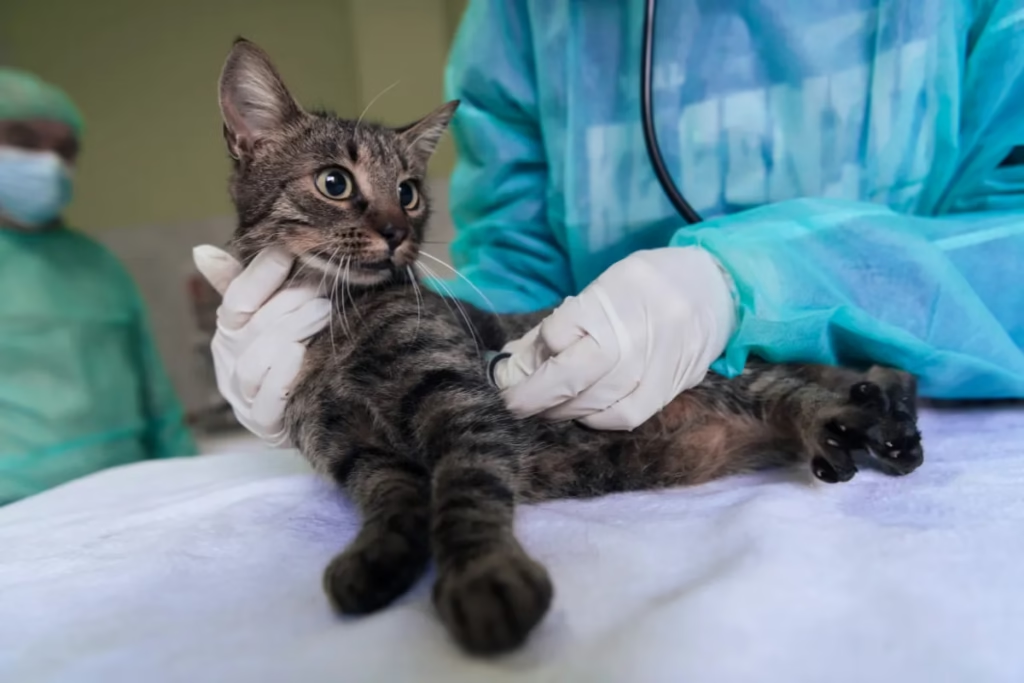
Tips to keep pets away from Money Plant
To keep your pet safe from the Chinese Money Plant and other potentially harmful plants, try these easy steps:
Additionally, regularly check your plants for potential chemical residues and ensure they are clean and safe. Creating a pet-friendly environment with appropriate distractions and alternatives will help keep your plants and furry friends happy and healthy. You can it outside also but before it must know that is money tree can live outside in winter and summer.
Releated: Is ZZ plant toxic to Cats and Dogs
So, Is the Money Plant Safe for Pets?
Yes — the Money Plant is non-toxic to cats and dogs, making it a perfect pet-friendly houseplant. Still, it’s smart to keep curious paws away, as chewing too much can cause mild stomach upset. After all, your pet’s obsession isn’t about nutrition — it’s about texture, movement, and curiosity. And maybe, just maybe, a little plant jealousy. Pair it with other safe picks like the Boston fern, Areca palm, or Peacock plant to grow a beautiful, pet-safe space.


